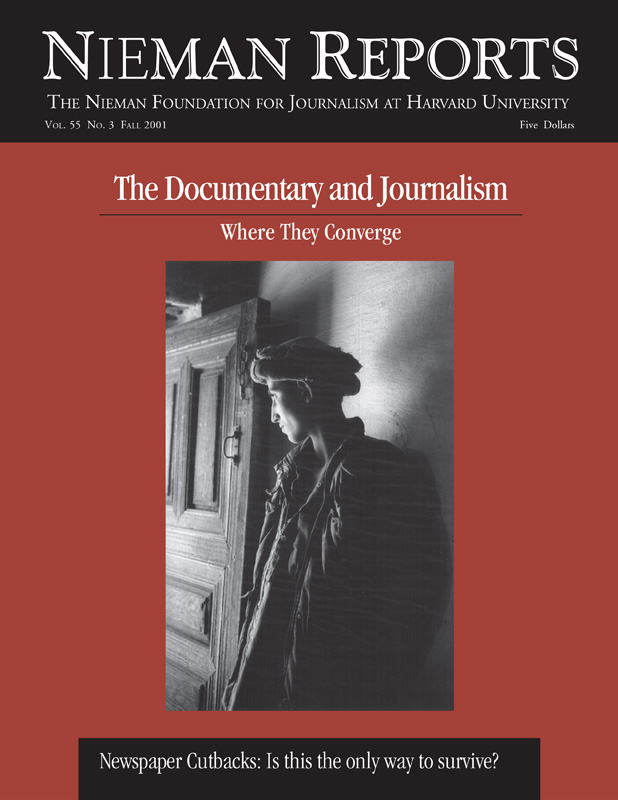I know exactly when it was that I realized I needed to be more savvy about the newspaper business. It was late one afternoon in the 1980’s, and all the lights had gone out in a power failure at The Miami Herald. And the teacher was getting totally exasperated with the few of us who still didn’t understand break-even analysis.
I was struggling through a Knight Ridder seminar called “Financial Management for Nonfinancial Managers.” There were production and circulation and advertising people and a few editors—John Carroll, now editor of the Los Angeles Times; Jerry Ceppos, now the vice president/News of Knight Ridder, and Lou Boccardi, now the president of The Associated Press.
We were separated into teams to do simulated computer exercises on newspaper budgets. We had to come up with the right, profitable answers. I remember looking at my team member Boccardi as we realized our team had to cut newshole, and I knew this was going to be the hardest part of my new job as executive editor of the St. Paul Pioneer Press.
I knew then and I know much more now that the newspaper business is a business. But it’s not the reason I got into it. It’s not the reason I stay in it. I care deeply about the business; all good editors do. We care about our newspapers being prosperous. We care about increasing circulation and advertising. We want to be team players, though we need to curb the arrogance that we could run all the business departments better than the people in them.
But, hey, admit it, business sometimes bores our collective ass unless we’re writing about it. It will never thrill us like a great story. We say it interests us when we’re around business-side folks, but it’s almost never what we talk about among ourselves except when business is bad.
Business sucks this year, so we talk about it a lot.
Lots of editors are having to do things they don’t want to do. I am lucky. I haven’t had to do anything this year that I think is wrong or long-range stupid and neither have other Newhouse editors I talk with daily. We have the luxury of working for a private company that doesn’t have to meet Wall Street expectations.
I think the issue that most disheartens editors under intense financial pressure is this: When the pressures are too strong, it is hard to make decisions on what is right or wrong journalistically. We make the decision on how much something costs. We worry about having a big story break, because we know it will demand overtime and newshole that will break our budget. We are often caught between a newsroom that resents the cuts and a publisher or a corporate manager who thinks the newsroom is not doing its part.
So when the crunch comes, editors have to understand business or lose all control over how the money is allocated. We can’t slough off the publisher or corporate management. Our newsrooms expect us to do battle over budget cuts and might even blame us for them, but we know there’s only so many battles we can wage.
I do not know one editor who loves budgeting. We do it because we have to do it, and if we’re clever enough, we can use it to help our journalistic purpose. I think my present employers are princes for knowing I’m an editor first.
Besides my present employers, one of my favorite people in the newspaper business, Larry Jinks, talks about “unifying the enterprise.” Jinks, a retired Knight Ridder editor, publisher and corporate executive, is fond of saying there are ways to bring journalism and business together productively. And, indeed, he is right. I’ve participated in several of them—dreaming up special sections with the advertising department, having the circulation folks involved with news and deadline decisions.
But editors are editors, and they’ll never be as good at business as business people. And I don’t expect business people to be good editors. After that long-ago seminar, I was proud that I learned how to do the newsroom budget on my own, but it never came anywhere near the pride I felt in breaking good stories, investigations that mattered and, frankly, in winning a couple of Pulitzers.
But then, at Newhouse, I was given both the financial and journalistic oversight over Religion News Service, a wonderful little band of journalists who cover the world of faith and morals better than anyone in the world. And I care deeply about it. I was and am in charge of making sure it is at least a break-even enterprise. I tell the editor when he is spending too much money. I worry about new sources of revenue. I don’t want to lose a customer.
It took a few years but, thank God, we are mostly in the black. Break-even analysis, don’t fail me now.
Deborah Howell is Washington bureau chief for Newhouse Newspapers and editor of Newhouse News Service, which owns Religion News Service. She formerly was the editor of the St. Paul Pioneer Press and the city editor of the late Minneapolis Star.



